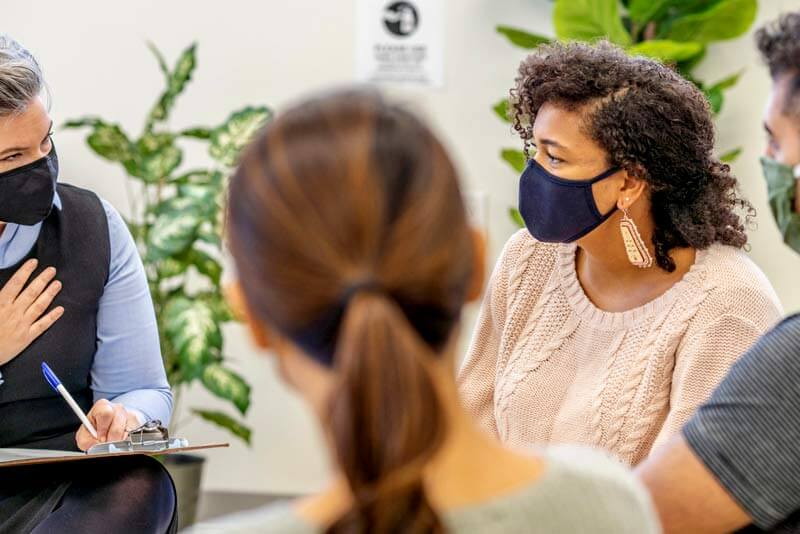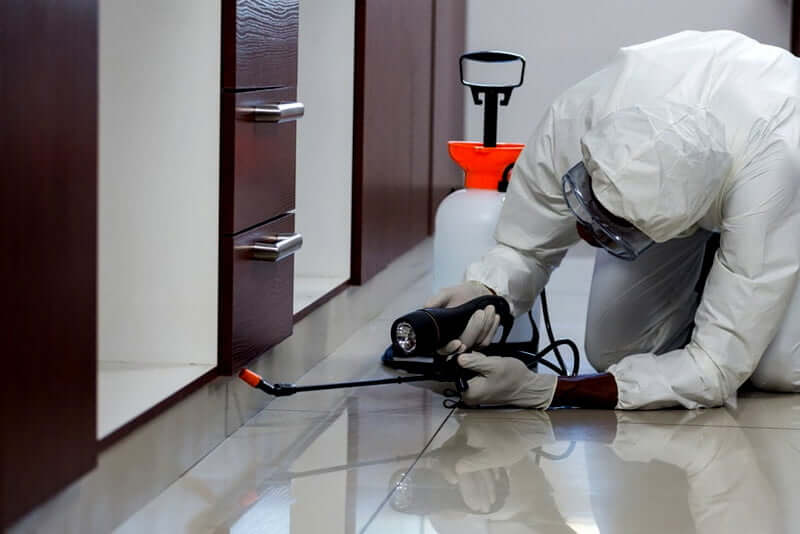Pest control should always be included in a lease.
If you provide the necessary documents to prove or validate your personal or health reasons for not agreeing on pest control, then your landlord should work with you.
The lease controls situations whether pest control is needed or not and the conditions whenever pest control is indeed needed. You can always negotiate with your landlord and seek legal counsel if major conflicts arise.
The law dictates that landlords should be able to provide a safe and habitable environment for the tenants. On issues like pest infestations, it is the landlord who is responsible for pest control at a rental property.
The responsibilities of the landlord always include the safety of the tenants, whether it means regularly having pest controls or treating the building for pests whenever necessary.

Who should pay for pest control, the Landlord or the Tenant?
Although it is mentioned that it is mainly the landlord who is responsible for pest control, the financial responsibility does not necessarily have to fall on the landlord’s shoulders.
There are certain situations that can determine whether it is the landlord or the tenant who should pay for pest control. It is imperative to be aware of these situations to avoid conflicts as pest control is not always cheap.
Landlord
- A landlord is required by law to provide and maintain a safe and habitable environment in their rental properties for their tenants.
- Pest infestation compromises a livable environment and should therefore be eliminated.
- As it threatens the quality of living in the building, it is up to the landlord to arrange for pest control with a high chance of paying for it.
- The landlord should be the one to pay for pest control if the infestation is caused by natural circumstances. He should also be the one responsible for hiring the service company.
- Say the rental property is near a grassy field. A location like this is most likely to have problems with rodents and mice.
- Since the location of the property is not under the tenant’s control, the landlord will be held responsible.
- In the event of a pest infestation report by a tenant, it is the landlord’s job to remedy the issue immediately and pay for pest control since the location of a rental property has nothing to do with the tenant.
- In this situation, the financial responsibility will belong to the landlord. Other pest infestations include ants, bedbugs, cockroaches, spiders, termites, and wasps.
A landlord, who is responsible and has his tenants’ safety as his number one priority, should regularly make arrangements for maintenance and pest prevention. This is to avoid pest infestation reports in the first place.
Tenant
- A tenant pays for pest control if the pest infestation is caused by his or her behavior or actions. The living conditions of a tenant could very well be the cause of a problem like this.
- A tenant is only accountable for the cost of pest control if the infestation was caused by his or her behavior.
- How the tenant is living in his or her unit could be the main cause of how the pest infestation started.
- Many kinds of pests are attracted to filthy areas of the place, especially when food crumbs are left uncleaned.
- If garbage is not regularly taken out or food is not stored correctly, this could attract pests like ants and cockroaches.
- Tenants who fail to do their obligation in keeping the cleanliness of their unit could be responsible for paying for pest control.
- Proper disposal of trash and proper food storage are some of their responsibilities to avoid this kind of problem.
- If it is discovered with proof that the tenant’s way of living is attracting the pests, then the tenant should pay for pest control.
- Another responsibility of the tenant is to report leaks and a rise in moisture levels because other than mold growth, this could also attract certain pests.
- Issues like these should be reported to the landlord immediately. The tenant could be at fault for negligence if they fail to report any physical damage that led to the pest infestation.
Leaving trash around and creating out-of-place holes in the walls to make a place for wires and cables are examples of negligence by a tenant. All situations where a tenant pays for pest control are results of bad housekeeping.
The tenant should also pay for pest control if their pets have caused a flea infestation. Most landlords that allow for pets in the building require them first to be free from fleas.
Can a tenant sue their landlord for pest infestation?
Yes.
If the landlord fails to eliminate the pest infestation within the deadline, which is usually a considerable amount of time, the tenant can sue the landlord. Legal action may be taken if the landlord continues to be negligent of the problem.
A landlord should be responsive to complaints. If a tenant reports a pest infestation, it should be addressed right away to prevent the infestation from getting more severe.
A report on pest infestation should be submitted to the landlord just like any other complaint – a written letter with all the details and evidence (pictures) should be included.
Should the situation be taken up to court, this written complaint will be useful to support your case as the tenant.
Landlord responsibilities when a tenant reports a pest infestation
Complaints, whether big or small, are part of the daily life of a landlord. It is their job to take these complaints seriously and address them right away by finding solutions.
Neglected complaints or reports can lead to legal action especially when the issue disrupts the tenant’s safety and the habitability of their unit. A proper landlord should know how to address pest infestation reports.
Here are steps on how landlords can properly address this issue:
Looking into the issue immediately
- A landlord should always be responsive to tenants’ complaints. This shows that they care about the safety and quality of their tenants’ living conditions.
- Asking about the situation to get more details is a good response.
- Looking for potential solutions shows responsibility. And if tenants see that a landlord is responsible, that could be really good for business.
- It makes renters happy, and open to renewing their leases and telling other people about it.
Identifying the type of pest(s) present in the building
- It is important to identify the type of pest that is present in the building. By knowing its type, it will be easy to know where the source is and what the causes might be.
- If rats are found, it could be that there are holes or damaged walls/ceilings that allow them entrance. If it’s cockroaches, then it could be an issue of sanitation.
- Most landlords can easily do this by themselves, but if uncertainties come up, it is always best to contact an expert.
Letting everybody else in the building know
- Having a pest infestation in the building is not a small matter. In worst cases, it would require everyone in the building to relocate temporarily.
- Even if the infestation is not that severe, everyone should still know about it.
- It is the landlord’s responsibility to inform everyone in the building of a pest infestation.
- By letting everyone know, the landlord could stay on top of things. Other tenants’ information about it could also help the case.
- Keeping an issue like this a secret will just create more problems. If everyone is informed about the infestation, people could be warier.
- If tenants are aware that there is a pest infestation in the building and that the landlord is on it, it may help them feel calmer about the situation.
Exterminating pest infestations
- After the landlord has received the report and responded to it, it will finally be time to exterminate the infestation. The landlord does this by arranging pest control with a pest control company.
- Some light cases of pests can be fixed with DIY solutions. Some landlords could cover up holes by themselves. But there are times when buildings infested with pests require a long-term fix.
- This is why the best option is to always go for experts. It is always the landlord’s responsibility to opt for solid, long-term solutions that are in the best interest of his tenants.
Landlord rights in pest control
Even though it is the landlord’s responsibility to maintain the habitability and safety of the rental property, it becomes the tenant’s responsibility to continue the condition of the unit by not causing any damage and keeping things clean.
While it is the landlord’s duty to maintain his rental property safe and livable, it becomes the tenant’s responsibility to keep up the condition of the unit with good housekeeping.
If a pest infestation is reported, the landlord has the right to know the cause of the infestation. Should it be discovered that the tenant indeed caused the infestation, then the landlord will be relieved from the costs.
However, even if this was the case, the landlord should be able to provide proof that at the beginning of the tenancy, there were no problems with pest infestations.
What can a landlord do to prevent pest infestations in properties?
Landlords can only do so much to prevent pest infestations on their properties. Pest control is one of the things they can do to fix this, besides obligating tenants to do proper waste disposal, cleanliness of the property, and proper food storage.
Regular pest control should be included in the lease. If a landlord plans on having pest control quarterly, it should be mentioned in the agreement. The landlord has the right to access provided that proper notice has been given to the tenant.

Tenant's rights in refusing pest control
Rights and opinions vary about tenants refusing to have their apartments treated. This is why it is very important to take your lease seriously.
Sometimes, it can be inconvenient for tenants to have to adjust their schedules to accommodate pest control in their unit or the building. Some do not even know how to prepare their apartments for pest control.
While they may seem understandable, these reasons for refusal will not be entertained and pest control will continue.
Regular pest control is one of the landlord’s responsibilities to keep the rental property safe and livable as they are dictated by law. To refuse this service, one must have a legitimate reason to steer clear of pest controls.
Most people agree that a tenant can refuse pest control if they have legitimate health concerns. Providing the right medical documents will help in refusing the treatment.
Pest control in households
Pest control involves a lot of chemicals and can understandably harm one’s health. If you are worried because of a medical reason, then your landlord should be able to work with you.
However, refusing pest control varies from case to case. Some leases may allow a landlord to charge the tenant the costs of the treatment, and some even allow the tenant’s eviction.
Nevertheless, when a landlord already hands the notice regarding pest control in a few days or weeks, it is the tenant’s responsibility to express his or her concerns before the treatment, and not on the day of the treatment.



